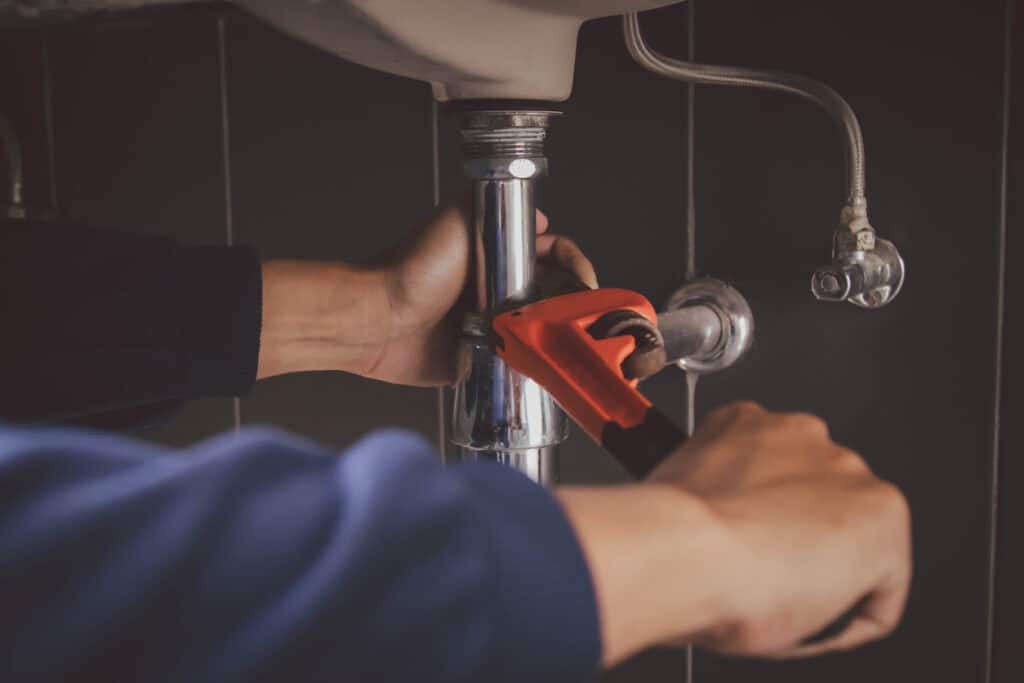
We normally take running water for granted. But if the pressure is weak, it can put a damper on things. Knowing why water pressure might be low helps you address the potential causes. Fortunately, there are things you can try to do yourself before you call in the professionals. Our Las Vegas plumbers explain how to improve your water pressure.
Why Is my water pressure low?
What causes low water pressure? Sometimes, just determining the cause means you can address the situation directly and be done with it quickly. While there can be many causes of reduced water pressure in your home, these are a handful of common ones we deal with on a regular basis:
- Time of Day – If multiple people are using water at the same time, that can lower water pressure. It might be that you have more than one person using different bathrooms in your home, especially if they are showering at the same exact time. You might even have the same scheduler for using water as your neighbors.
- Mineral Deposits – If your home is older, then it might have galvanized iron pipes. These can accumulate buildups of minerals as the years go by. They might even corrode to the point that water flow is restricted.
- Pressure Regulator Failure – Pressure regulators are typically set anywhere from 45 psi up to 60 psi. As years or decades go by, they might wear down.
- Pipes Are Leaking – A leak is another common reason your water pressure is less than optimal in your home.
- Clogged Pipes – If there is an obstruction in your pipes, the water cannot flow freely and the pressure could drop.
Need help with water pressure? Contact our trusted plumbing technicians for a free estimate.
10 Tips to Improve Your Water Pressure
In addition to trying to find the root cause itself, there are other steps you can take that might help restore water pressure in your home. These are good DIY tactics oh how to adjust water pressure in house before calling the professionals.
Related: Las Vegas Seasonal Plumbing Maintenance Guide
1. Talk to Your Neighbors
If you have neighbors suffering the same issues, it might not be your home or property with the issue. There could be a bigger issues at play and may require assistance from the city or a professional plumbing company.
2. Inspect Your Well Pump
If you’re not on city water, your home’s well pump might need maintenance. Some well pumps work better in specific situations, while others need routine maintenance to work at optimal levels.
3. Use a Water Pressure Gauge to Test Your Pressure
Testing the water pressure yourself can give you a better idea of how weak your water pressure really is. You can do this by using a water pressure test gauge that screws onto a hose faucet. Then, simply turn on the faucet to get an accurate reading. Compare that number to the appropriate water pressure for your area to see if you really do have low water pressure.
4. Call Your Local Water Department
If you’ve ruled out everything in your own home or on your property, someone from the municipal water department should come out and see if they can find any issues on their end.
5. Clear Clogged Pipes
Oftentimes, there could be a clog in your pipes that is restricting your water flow. The clog could be debris that built up or a deposit of minerals usually found in hard water. When these obstructions accumulate and decrease pressure, it could affect your entire home.
Got a plumbing emergency? Larkin Plumbing is ready to help! Contact us now to get an emergency plumber to your property today.
6. Check That Your Main Water Valve Is Completely Open
Most homes have two different water meter valves. The home valve is usually located in front of the home, and the customer water pressure valve is in your designated water meter box. If either of them is turned just a bit from the “on” position, your whole home might suffer from weak water pressure or even no water pressure at all.
7. Check for Leaks
Leaks can be hard to find, but a leaking pipe can result in reduced water pressure. If you want to find out if this is happening, get a reading from your home’s water meter. Once you do that, shut off every faucet in your home and leave for several hours so there is no water use anywhere. When you come back, get another meter reading. If you see a difference, then you likely have a leak happening somewhere.
8. Replace Old or Corroded Pipes
Old galvanized steel pipes can become corroded and weak over time, so it’s a good idea to replace any pipes that are older or have been compromised. This is often a pretty big project, so you may need to work with a professional plumber. They have the skills to do the job right with better quality copper or plastic pipes.
9. Replace an Old Regulator
Some homes have instruments that regulate water pressure and help prevent water from the public service line from entering the pipes too quickly. However, when these regulators go bad, they can affect water pressure by causing the pressure to drop over time.
10. Install a Water Pressure Booster
A water pressure booster pump for house use is a piece of equipment that does just what the name implies when installed properly. You can shop for them on your own, but the installation is something you should probably leave to a professional plumber.
Related: What Is Hard Water?
What If None of That Works?
Water pressure low? Should none of those tips work, or you’re just still not satisfied with your water pressure, give us a call! We’ve got the tools, techniques, and experience to get your water pressure back to where it was and the level you need for your home. We can help address things like:
- How to increase water pressure in shower or tubs
- How to adjust pressure regulator
- Intalling booster pump for house or commercial properties
- How to increase water pressure form a well
- How to improve low water pressure in sink
The experienced technicians at Larkin Plumbing are ready to help 24/7 with no additional charges for nights, weekends, and holiday plumbing emergencies.

